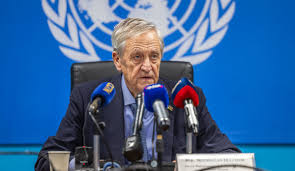
The ongoing conflict in Sudan is contributing to instability in South Sudan, where economic challenges and political uncertainty are escalating, as highlighted by the Head of the United Nations Mission in South Sudan (UNMISS) during a Security Council meeting on February 5, 2025.
Nicholas Haysom, the Special Representative of the Secretary-General and Head of UNMISS, remarked that the adverse effects of the Sudan conflict are impacting South Sudan, particularly evident in the unrest in Juba and other regions following the reported killings of South Sudanese individuals in Wad Madani.
This unrest is unfolding amid a worsening economic crisis. Haysom indicated that the cost of an average food basket has increased by 200 percent, inflation has reached 107 percent, and nearly ten months’ worth of government salaries remain unpaid.
Furthermore, the South Sudanese government has requested that UNMISS vacate part of its headquarters within 45 days, a demand Haysom described as imposing “significant costs and a logistical schedule that we currently cannot meet.”
He emphasized that restrictions on peacekeepers in certain areas further complicate UNMISS operations, but he reaffirmed the mission’s commitment to constructive dialogue through the High-Level Coordination Committee.
Economic instability has been exacerbated by disruptions in oil exports, a crucial revenue source for South Sudan, as noted by Charles Tai Gituai, Interim Chairperson of the Reconstituted Joint Monitoring and Evaluation Commission. He stated that the main pipeline transporting approximately 60 percent of crude oil to Port Sudan has been damaged and remains unrepaired, resulting in a substantial decline in revenue.
Amid these challenges, concerns regarding the integrity of the upcoming elections are increasingly prominent.
Edmund Yakani, the Executive Director of the Community Empowerment for Progress Organization (CEPO), underscored that the integrity of elections hinges on critical actions from the government.
Yakani stressed the necessity of a “swift political decision from the presidency,” “cohesion among various factions,” and “adequate and timely financial resources for the elections, accompanied by a clear timeline.”
Nicholas Haysom pointed out that as South Sudan approaches the fourth extension of its transitional period under the 2018 Revitalized Peace Agreement, there is a consensus that any further delays are intolerable.
The citizens of South Sudan have demonstrated considerable patience, yet there is mounting pressure on leaders to meet the established benchmarks of the peace process without requesting additional extensions.
Cecilia Adout Majok Adeng from South Sudan acknowledged “the apprehensions regarding the delays in the transitional process.”
She assured the Security Council that “efforts are underway to accelerate key milestones, particularly in the preparations for fair, free, and credible elections.”
The representative affirmed, “We acknowledge the challenges faced by the election-related bodies and reiterate our commitment to providing the essential funding and institutional support to strengthen the electoral process in our nation.”




